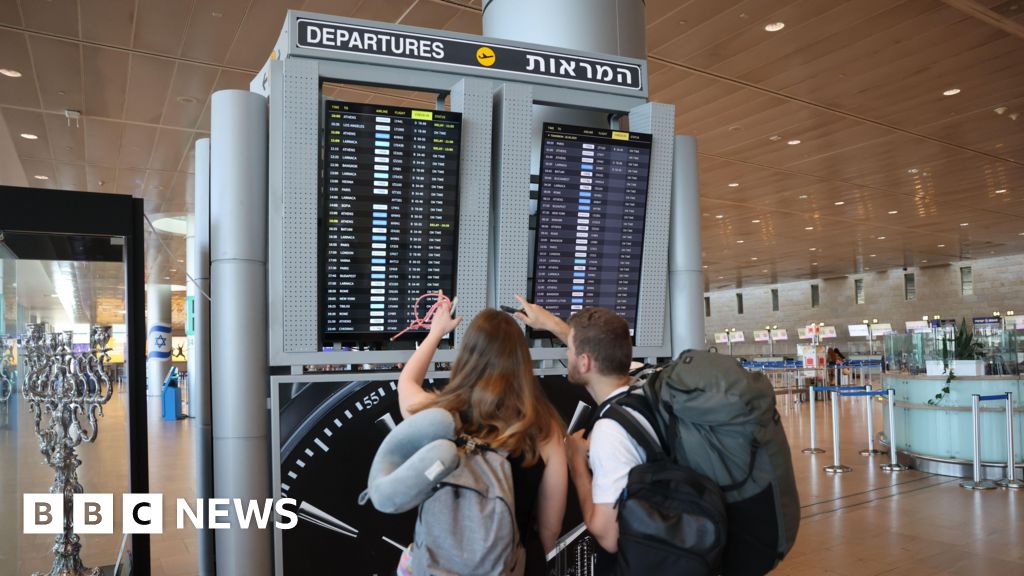The government has loosened its travel advice for Israel, as a final evacuation flight for British nationals is set to depart from Tel Aviv on Sunday. The move comes after Israel reopened its skies for commercial air travel following a ceasefire agreement that ended a 12-day conflict with Iran. After missile exchanges between the two countries began, the foreign office had advised against all travel to Israel and the Occupied Palestinian Territories. On Friday, the government eased its guidance to advise against all but essential travel to most parts of Israel, the West Bank, and the Golan Heights. It still advises against all travel to parts of northern Israel, the West Bank and the Golan Heights, and to all of Gaza. The foreign office said a sixth evacuation flight from Israel for British nationals was scheduled for this weekend and would be the last, amid falling demand as commercial options increase. "The safety and security of British nationals is our top priority," a spokesperson said. "The government has organised multiple flights evacuating British nationals and their dependants from Tel Aviv, prioritising the most vulnerable. These flights will end if there is not sufficient demand." The UK has already stopped providing onward transport options for British nationals who have crossed Israel's land borders into Jordan and Egypt. A US and Qatar-brokeredceasefire between Israel and Irantook effect on Tuesday, but in its advice to travellers, the foreign office acknowledged the situation was "fragile... with the potential to deteriorate further". The government said it would keep the situation under review. The conflict began on 13 June when Israel bombed nuclear sites and military targets in Iran, prompting Tehran to respond with missile strikes. Following 12 days of back-and-forth attacks, Iran's health ministry said 610 people had been killed, and Israel's health ministry said 28 people had been killed. British nationalsleft strandedwhen Israeli airspace was closed due to the conflict were urged to register their presence with the UK government. On Monday, Downing Street said about a quarter of the 4,000 people who had registered their presence in Israel or the Occupied Palestinian Territories had asked for a seat on an evacuation flight.
UK eases Israel travel advice as evacuation effort winds down
TruthLens AI Suggested Headline:
"UK Government Eases Travel Advisory for Israel Amid Final Evacuation Flight"
TruthLens AI Summary
The UK government has recently updated its travel advice for Israel, easing restrictions as the last evacuation flight for British nationals is scheduled to depart from Tel Aviv on Sunday. This decision follows a ceasefire agreement that concluded a 12-day conflict between Israel and Iran, during which the UK Foreign Office had initially advised against all travel to Israel and the Occupied Palestinian Territories due to escalating tensions and missile exchanges. The new guidance now recommends that travel to most areas of Israel, the West Bank, and the Golan Heights should be limited to essential purposes only. However, it continues to advise against all travel to northern Israel, parts of the West Bank, the Golan Heights, and all of Gaza, reflecting ongoing security concerns. The Foreign Office emphasized that the safety and security of British nationals remains the government’s top priority, and they have organized multiple evacuation flights prioritizing the most vulnerable individuals among those stranded by the conflict.
In light of the reduced demand for evacuation as commercial flights resume, the UK government has ceased providing onward transport for those who have crossed into Jordan and Egypt. The ceasefire, brokered by the US and Qatar, took effect earlier in the week, but the Foreign Office has cautioned that the situation remains precarious and could worsen. The conflict began with Israel targeting Iranian nuclear sites and military assets, leading to retaliatory missile strikes from Iran. Reports indicate significant casualties on both sides, with over 600 deaths reported in Iran and 28 in Israel. As of Monday, approximately a quarter of the 4,000 British nationals who had registered their presence in the region expressed a desire for seats on the evacuation flights, highlighting the ongoing challenges faced by those still in the area as the government continues to monitor the situation closely.
TruthLens AI Analysis
You need to be a member to generate the AI analysis for this article.
Log In to Generate AnalysisNot a member yet? Register for free.
